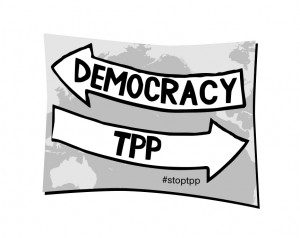 Here’s what you need to know – the Obama administration still has sights set on completing the Trans-Pacific Partnership, the largest treaty of its kind, with secret text, closed door negotiations and a yes/no vote in Congress, without debate or discussion. We can prevent this, and we must be prepared to act this November.
Here’s what you need to know – the Obama administration still has sights set on completing the Trans-Pacific Partnership, the largest treaty of its kind, with secret text, closed door negotiations and a yes/no vote in Congress, without debate or discussion. We can prevent this, and we must be prepared to act this November.
A Summary of Recent TPP Negotiations – Ottawa to Hanoi
The failed attempt to have Fast Track (or TPA – Trade Promotion Authority) ended in the spring session of Congress, but has not stopped rounds of discussions between country and corporate negotiators through the summer.
Eight days of talks occurred in Ottawa, Canada in early July. While certain concessions were reached dealing with trade in services and intellectual property, agreements between the U.S. and Japan stalled, with Japan seeking exclusion of sensitive agricultural products (rice, wheat, sugar, dairy, beef and pork) from the TPP.
Negotiators met for another ten days of talks in Hanoi, Vietnam, which concluded (sadly for us, those opposing the TPP) with optimistic messaging from the U.S. Trade Representative (USTR). In a statement released, it announced,
“Having reduced the number of outstanding issues, the United States and the other 11 TPP countries share a commitment to resolve the remaining issues as quickly as possible, including both on the text and market access packages.”
However, not all the reports our of the Hanoi round were as rosy, with others stating only ‘limited progress’ was achieved.
Additionally, Japan’s deputy chief negotiator for the Trans-Pacific Partnership, Hiroshi Oe said, “We were not able to make as much progress as we had expected,” after leaving a working-level meeting with Acting Deputy U.S. Trade Representative Wendy Cutler in Tokyo.
Each and every stalled round of negotiations is good news for us, giving us more time to mobilize to stop the TPP from passing!
The November Push
While no ‘next’ TPP negotiating meeting has been officially announced, the focus is clearly on November when leaders of TPP countries will gather for the Asia-Pacific Economic Cooperation (APEC) summit taking place in China from Nov. 10-11, the East Asia Summit taking place in Myanmar during the week of Nov. 9, and the G20 leaders’ summit taking place Nov. 15-16 in Australia.
President Obama, the USTR and Republican members of the Ways and Means Committee have referred to these November meetings as places where side TPP negotiations can take place.
Also on deck for November, in the United States Congress, is the likely re-introduction of a version of Fast Track (TPA) – with hopes that when TPP text negotiations conclude there will be swift federal approval of the treaty. Both Senate Finance Chair Ron Wyden and Speaker of the House John Boenher have stated that they intend to prioritize TPA during the Lame Duck session.
On September 10, over 600 organizations, including Global Exchange, signed and delivered a letter to the Chairman of the Finance Committee, Sen Wyden, to register dissent with the Fast Track model and lay out provisions for “a new system for negotiating and implementing trade agreements that provides for more congressional and public accountability.”
Meanwhile, in Berkeley, CA, on September 9, the Berkeley City Council passed the Berkeley Resolution to Protect Democracy and the Public Interest from TAFTA & TPP Trade Agreements. The resolution declares Berkeley to be a TPP and TAFTA Free Zone. Berkeley will not recognize trade provisions and tribunal rulings related to these agreements. Specifically, it states:
“to every extent allowable by law, rules which do not promote the interests of workers, protect the environment, and improve the quality of life in all participating countries and which were negotiated without transparency as well as meaningful congressional and public input, and related tribunals’ rulings, will not be recognized.”
*The TAFTA is the TransAtlantic Free Trade Agreement (TAFTA), also currently under negotiation the is a proposal to create a trans-atlantic free-trade area covering Europe and North America. Such proposals have been made since the 1990s and since 2013 an agreement between the United States and European Union has been under negotiation: the Transatlantic Trade and Investment Partnership. Once complete, if combined with free trade agreements with Canada, Mexico and the European Free Trade Association it could form a free trade area covering a large portion of the two continents.
TAKE ACTION!

Defeating the TPP depends on taking action this fall. Once the mid-term elections are over, things are expected to move fast. Stay up-to-date by joining Global Exchange’s News and Action email list for updates and action alerts.
Call your Representative’s office and leave a message urging them to oppose Fast Track in any form. The Congressional switchboard number is (202) 224-3121.
Join the Week of Action November 8-14. We’ll keep you up to date, also check here.
